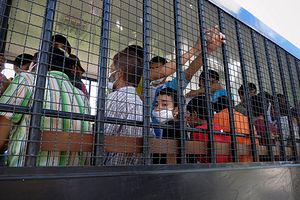Thailand’s recent deportation to China of more than 100 Uyghurs – the majority ethnic group in China’s Xinjiang Uyghur Autonomous Region – drew a rebuke from the United Nations. It also prompted a strong public reaction within Turkey, which led to the Turkish government reiterating its determination to receive Turkic-speaking Uyghurs fleeing China.
In response, Beijing published a report on home-grown terrorism, claiming that police in China’s Yunnan Province have shot dead “four violent terrorists” and arrested 553 “extremists” attempting to leave China for foreign warzones like Syria and Iraq since 2014. While not making direct reference to the Xinjiang Uyghurs, the subtext to such pronouncements is that the Uyghurs attempting to leave China have strong links with global terrorism, and pose a genuine security threat.
The Problem of Xinjiang
Few people outside China knew about Xinjiang or the Uyghurs before news of Uyghur fighters joining the Islamic State started being reported internationally. This is in stark contrast to Tibet, which many view as a historically independent region, and where China’s authoritarian approach has regularly found itself in the international spotlight.
The international media’s focus on the Islamic State’s Uyghurs has had the unfortunate effect of shoehorning perceptions of Uyghurs into the global grand narrative of culture clash, terrorism, and Islamic threat.
The reality is much more complex.
For a start, the movement – both legal and illegal – of Uyghurs between China and its Central Asian neighbors like Kazakhstan and Kyrgyzstan has long preceded the global focus on international terrorism. The Uyghurs are a Turkic people. Their history, language, culture, religion and lifestyle far more closely resemble the Turkic peoples of Central Asia than the Han Chinese who comprise 92 percent of China’s population.
This sense of ethnic difference has to a large extent formed the basis of longstanding anti-Han sentiment among the Xinjiang Uyghurs. The Chinese leadership has also for decades perceived these sentiments as the presence of a separatist movement in Xinjiang.
The Uyghurs’ situation is complicated by the fact that Xinjiang – a vast oil- and gas-rich swathe of territory in China’s northwest occupying one-sixth of the country’s area – is of great strategic value.
Perceived Religious and Cultural Suppression
The Chinese government has repeatedly emphasized the importance of interethnic harmony in Xinjiang and rapid integration of the Uyghurs into the Han-dominated Chinese society. Yet, many Uyghurs see policies intended to promote these goals as attempts to suppress their culture and religion.
Compared to the Hui Muslim communities of central and eastern China, Uyghurs face many more restrictions on their religious expression and way of life. While Xinjiang houses many distinctive mosques, women, students, and public servants face significant restrictions on entering them. Praying in schools, wearing headscarves to work, and fasting during Ramadan are also severely circumscribed. The study of the Qur’an and Arabic is tightly controlled. Even the Uyghur language is being gradually phased out in most educational institutions in Xinjiang.
The increasing security presence in the region, whether in the form of “re-educating” religious leaders or the installation of surveillance cameras and sharp increases in inspection routes, serve to ensure that religious institutions do not advocate Islamic values that are not endorsed by the Chinese state.
Migration and Economic Disparity
The migration of Han Chinese into Xinjiang and the significant Han-Uyghur economic disparity are also major sources of unhappiness among the Uyghurs.
Government-sponsored immigration of Han Chinese into Xinjiang has always been a central component of the Communist Party of China’s policy in Xinjiang. The proportion of Han Chinese living in the region rose from about 5 percent in the 1940s to about 40 percent today. There is large-scale unemployment among the Uyghurs, including young university graduates. Han Chinese are also over-represented in local government jobs.
Beijing has asserted that the quality of life for Uyghurs has improved significantly. Yet deep-seated resentment among the Uyghurs remains, resulting in significant ethnic tensions in Xinjiang. This culminated in the series of violent riots in Xinjiang’s capital, Urumqi, in 2009. This inter-ethnic violence in Xinjiang remains a significant problem today.
Risks of Conflation
It may not be the place of other countries to interfere in China’s domestic policies. It may also be debatable whether countries like Thailand have an obligation to open their doors to asylum seekers such as the Xinjiang Uyghurs.
However, it is critical for both Beijing and the international community to recognize that the uneasy coexistence between the Uyghurs and China’s Han majority is a deep-rooted socio-economic problem. China’s “Uyghur problem” was not created by the September 11 attacks or the rise of the Islamic State. Ethnic tensions and violence in Xinjiang stem from decades’ worth of discrimination, perceived religious and cultural suppression, and economic disparities.
Conflating domestic protest with international terrorism – which both Beijing and the international media are guilty of in the case of the Uyghurs – is unhelpful for two reasons.
First, it is a distraction. It reduces the pressure for governments to resolve domestic problems and tensions. This could result in further resentment and alienation among groups marginalized by state policies, and increase the allure of a violent but radically different world such as that promised by the Islamic State.
Second, as Brian Jenkins from the RAND Corporation suggested: “Some governments are prone to label as terrorism all violent acts committed by their political opponents …. what is called terrorism thus seems to depend on one’s point of view.” Overly broad definitions of terrorism can allow governments to label and punish dissenters as terrorists. Governments may therefore be tempted by a ready-made narrative to back up the claim that domestic unrest derives from outside influences rather than from authentic local concerns. This carries the risk of undermining the legitimacy of genuine international counter-terrorism efforts.
Angela Poh is a PhD Candidate at the S. Rajaratnam School of International Studies, Nanyang Technological University.
































